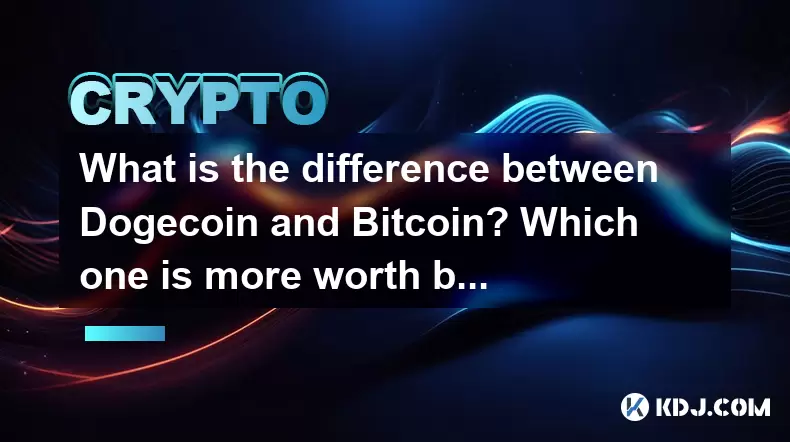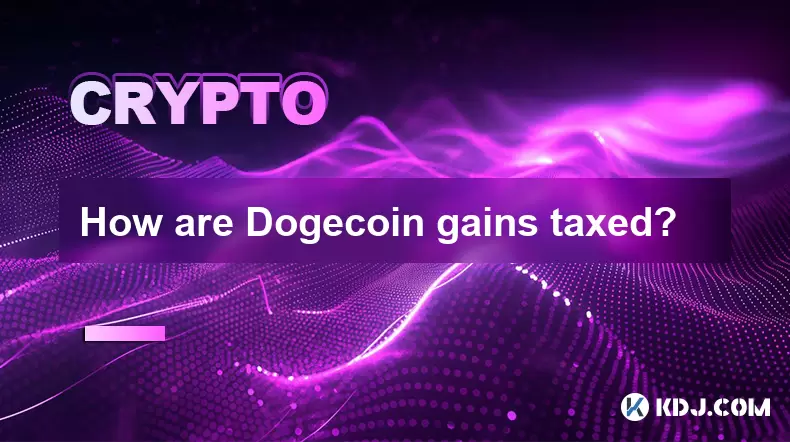-
 bitcoin
bitcoin $87959.907984 USD
1.34% -
 ethereum
ethereum $2920.497338 USD
3.04% -
 tether
tether $0.999775 USD
0.00% -
 xrp
xrp $2.237324 USD
8.12% -
 bnb
bnb $860.243768 USD
0.90% -
 solana
solana $138.089498 USD
5.43% -
 usd-coin
usd-coin $0.999807 USD
0.01% -
 tron
tron $0.272801 USD
-1.53% -
 dogecoin
dogecoin $0.150904 USD
2.96% -
 cardano
cardano $0.421635 USD
1.97% -
 hyperliquid
hyperliquid $32.152445 USD
2.23% -
 bitcoin-cash
bitcoin-cash $533.301069 USD
-1.94% -
 chainlink
chainlink $12.953417 USD
2.68% -
 unus-sed-leo
unus-sed-leo $9.535951 USD
0.73% -
 zcash
zcash $521.483386 USD
-2.87%
What is the difference between Bitcoincoin and Bitcoin? Which one is more worth buying?
Dogecoin, created as a fun alternative, uses Scrypt and has no supply cap, while Bitcoin, seen as digital gold, uses SHA-256 and is limited to 21 million coins.
May 10, 2025 at 07:35 pm

Dogecoin and Bitcoin are two of the most well-known cryptocurrencies in the market, each with its unique characteristics and uses. Understanding the differences between them is crucial for anyone considering an investment in either. In this article, we will delve into the key distinctions between Dogecoin and Bitcoin, and discuss which might be a more worthwhile investment based on various factors.
Origins and Background
Dogecoin was created in December 2013 by Billy Markus and Jackson Palmer as a light-hearted alternative to Bitcoin. Inspired by the popular 'Doge' meme featuring a Shiba Inu dog, Dogecoin was initially intended to be a fun and accessible cryptocurrency. It quickly gained a dedicated community and has been used for tipping content creators online and for charitable causes.
On the other hand, Bitcoin was launched in January 2009 by an anonymous person or group using the pseudonym Satoshi Nakamoto. Bitcoin was designed as a decentralized digital currency to serve as an alternative to traditional financial systems. It is often referred to as 'digital gold' due to its limited supply and store of value characteristics.
Technology and Blockchain
The technology behind Dogecoin and Bitcoin also differs significantly. Bitcoin uses a proof-of-work (PoW) consensus mechanism and operates on the SHA-256 hashing algorithm. Its blockchain is designed to process transactions at a slower pace, with a block time of approximately 10 minutes. Bitcoin's total supply is capped at 21 million coins, which contributes to its scarcity and potential for value appreciation.
In contrast, Dogecoin also uses a PoW consensus mechanism but operates on the Scrypt hashing algorithm. Dogecoin's block time is much faster, at approximately 1 minute, which allows for quicker transaction confirmations. Unlike Bitcoin, Dogecoin has an inflationary model with no cap on its total supply, with around 5 billion new coins minted each year.
Market Performance and Adoption
When it comes to market performance, Bitcoin has historically been the leader in the cryptocurrency space. It has the highest market capitalization and is widely recognized as the flagship cryptocurrency. Bitcoin's adoption by institutional investors, major companies, and even some governments has solidified its position as a legitimate asset class.
Dogecoin, while initially created as a meme, has seen significant surges in popularity, particularly in 2021. Influenced by social media and endorsements from high-profile figures like Elon Musk, Dogecoin's price experienced dramatic volatility. Despite its meme status, Dogecoin has been accepted as a payment method by some merchants and has a vibrant community.
Use Cases and Utility
The use cases for Bitcoin and Dogecoin also vary. Bitcoin is primarily seen as a store of value and a hedge against inflation. Many investors view Bitcoin as a long-term investment, akin to gold. It is also used for international remittances and as a payment method, though its adoption for everyday transactions is limited due to its slower transaction times and higher fees.
Dogecoin, with its faster transaction times and lower fees, is more suited for everyday transactions and microtransactions. It has been used for tipping on social media platforms, funding charitable causes, and even as a payment method for some goods and services. Dogecoin's community-driven nature and its fun, accessible image have contributed to its utility in these areas.
Investment Considerations
Deciding which cryptocurrency is more worth buying depends on various factors, including investment goals, risk tolerance, and market conditions. Bitcoin is often considered a safer investment due to its established track record, widespread adoption, and perceived store of value. Investors looking for long-term growth and stability may find Bitcoin more appealing.
On the other hand, Dogecoin offers the potential for higher volatility and short-term gains. Its community-driven nature and the influence of social media can lead to rapid price movements. Investors with a higher risk tolerance and those interested in the potential of meme-driven cryptocurrencies may find Dogecoin more attractive.
Community and Culture
The communities surrounding Bitcoin and Dogecoin are also quite different. Bitcoin has a more serious and technical community, with a focus on financial freedom and decentralization. Discussions often revolve around technical developments, regulatory news, and market analysis.
Dogecoin, conversely, has a more casual and fun-loving community. The Dogecoin community is known for its philanthropy and its use of social media to drive adoption and awareness. The light-hearted nature of Dogecoin has attracted a diverse group of users, contributing to its unique culture.
Frequently Asked Questions
Q: Can Dogecoin be mined like Bitcoin?A: Yes, Dogecoin can be mined, but it uses the Scrypt algorithm, which is different from Bitcoin's SHA-256. Mining Dogecoin requires specialized hardware, similar to Bitcoin, but the process is generally less competitive and can be more accessible to individual miners.
Q: Are there any significant security differences between Dogecoin and Bitcoin?A: Both Dogecoin and Bitcoin use secure blockchain technology and cryptographic methods to protect transactions. However, Bitcoin's larger market cap and more established infrastructure may make it a more secure investment overall. Dogecoin's faster block times can also make it more vulnerable to certain types of attacks, though the community remains vigilant in addressing security concerns.
Q: How do transaction fees compare between Dogecoin and Bitcoin?A: Dogecoin typically has lower transaction fees compared to Bitcoin. Bitcoin's fees can fluctuate based on network congestion, often making it more expensive to send transactions, especially during peak times. Dogecoin's lower fees make it more suitable for microtransactions and everyday use.
Q: What role do social media and influencers play in the value of Dogecoin compared to Bitcoin?A: Social media and influencers have a more significant impact on Dogecoin's value than on Bitcoin's. Dogecoin's meme-driven nature makes it more susceptible to price swings driven by social media trends and endorsements from high-profile figures. Bitcoin, while not immune to market sentiment, is generally influenced more by broader economic factors and institutional adoption.
Disclaimer:info@kdj.com
The information provided is not trading advice. kdj.com does not assume any responsibility for any investments made based on the information provided in this article. Cryptocurrencies are highly volatile and it is highly recommended that you invest with caution after thorough research!
If you believe that the content used on this website infringes your copyright, please contact us immediately (info@kdj.com) and we will delete it promptly.
- Crypto Coaster: Bitcoin Navigates Intense Liquidation Hunt as Markets Reel
- 2026-02-01 00:40:02
- Bitcoin Eyes $75,000 Retest as Early February Approaches Amid Shifting Market Sentiment
- 2026-02-01 01:20:03
- Don't Miss Out: A Rare £1 Coin with a Hidden Error Could Be Worth a Fortune!
- 2026-02-01 01:20:03
- Rare £1 Coin Error Could Be Worth £2,500: Are You Carrying a Fortune?
- 2026-02-01 00:45:01
- Navigating the Crypto Landscape: Risk vs Reward in Solana Dips and the Allure of Crypto Presales
- 2026-02-01 01:10:01
- NVIDIA CEO Jensen Huang's Take: Crypto as Energy Storage and the Evolving Role of Tech CEOs
- 2026-02-01 01:15:02
Related knowledge

Bitcoincoin burning mechanism
Jul 20,2025 at 09:21pm
What is the Dogecoin burning mechanism?The Dogecoin burning mechanism refers to the process of permanently removing DOGE tokens from circulation by se...

How to earn free Bitcoincoin?
Jul 19,2025 at 10:08pm
What is Dogecoin and Why Earn It?Dogecoin (DOGE) started as a meme-based cryptocurrency in 2013 but has grown into a widely recognized digital asset. ...

Is Coinbase a good wallet for Bitcoincoin?
Jul 19,2025 at 04:42pm
Understanding Coinbase as a Wallet Option for DogecoinWhen considering where to store Dogecoin, Coinbase is often mentioned as a potential option due ...

How to buy Bitcoincoin with PayPal?
Jul 23,2025 at 06:57am
Understanding the Basics of Buying DogecoinBefore diving into the process of buying Dogecoin with PayPal, it’s essential to understand what Dogecoin i...

Best app to buy Dogecoin
Jul 23,2025 at 03:08pm
What Is a Cryptocurrency Exchange and How Does It Work?A cryptocurrency exchange is a digital marketplace where users can buy, sell, or trade cryptocu...

How are Dogecoin gains taxed?
Jul 25,2025 at 07:01am
Understanding the Taxation of Dogecoin GainsWhen it comes to Dogecoin (DOGE), many investors are drawn to its meme-inspired branding and volatile pric...

Bitcoincoin burning mechanism
Jul 20,2025 at 09:21pm
What is the Dogecoin burning mechanism?The Dogecoin burning mechanism refers to the process of permanently removing DOGE tokens from circulation by se...

How to earn free Bitcoincoin?
Jul 19,2025 at 10:08pm
What is Dogecoin and Why Earn It?Dogecoin (DOGE) started as a meme-based cryptocurrency in 2013 but has grown into a widely recognized digital asset. ...

Is Coinbase a good wallet for Bitcoincoin?
Jul 19,2025 at 04:42pm
Understanding Coinbase as a Wallet Option for DogecoinWhen considering where to store Dogecoin, Coinbase is often mentioned as a potential option due ...

How to buy Bitcoincoin with PayPal?
Jul 23,2025 at 06:57am
Understanding the Basics of Buying DogecoinBefore diving into the process of buying Dogecoin with PayPal, it’s essential to understand what Dogecoin i...

Best app to buy Dogecoin
Jul 23,2025 at 03:08pm
What Is a Cryptocurrency Exchange and How Does It Work?A cryptocurrency exchange is a digital marketplace where users can buy, sell, or trade cryptocu...

How are Dogecoin gains taxed?
Jul 25,2025 at 07:01am
Understanding the Taxation of Dogecoin GainsWhen it comes to Dogecoin (DOGE), many investors are drawn to its meme-inspired branding and volatile pric...
See all articles





















![THIS IS THE HARDEST COIN TO GET [POLY DASH] THIS IS THE HARDEST COIN TO GET [POLY DASH]](/uploads/2026/01/31/cryptocurrencies-news/videos/origin_697e0319ee56d_image_500_375.webp)




















































